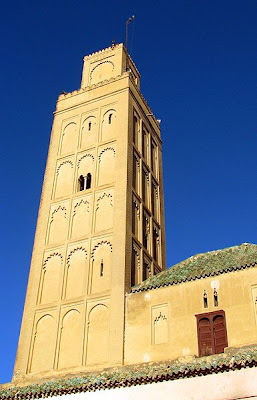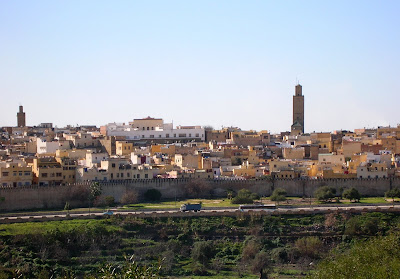My thoughts were abruptly moved from the east side of North Africa to the far west, from Egypt to Morocco, by news of the collapse of the minaret of the Bab Berdieyinne Mosque in Meknes on Friday, 19 February 2010.
A minaret is to a mosque somewhat as a bell tower is to a church. It is where the muezzin calls Muslims to prayer. A mosque is where many Muslims go to pray on Fridays, although some advantages of Islam are that no building is necessary for prayer and no priest is necessary to lead prayer. The faithful can pray anywhere. Usually, however, they prostrate themselves on a prayer rug facing in the direction of Mecca. This particular minaret, apparently a casualty of the very heavy rains that have been causing similar disasters and loss of life in other regions as well, was about 400 years old. The death toll appears to be climbing still. The last figures that I've seen indicate that so far 41 people have lost their lives in the collapse. Here is a photo of the minaret that was taken in December 2009.
The media have generally attributed the minaret's construction to Sultan Moulay Ismaïl Ibn Sharif, who reigned in Morocco from 1672-1727. In many ways, he was considered to be the Moroccan equivalent of Louis XIV. He was also the second ruler of the Alaouite dynasty, which is the ruling dynasty in Morocco today. He made Meknes his capital city, building some of it from stones plundered from the ancient Roman ruins at Volubilis nearby. In addition to being a prolific builder and a warrior king, the Sultan was also a prolific progenitor. He is said to have fathered almost 900 children through his harem of some 500 women.
Because the minaret is believed to have been some 400 years old, I am not sure that its construction can be attributed to Moulay Ismaïl. By my reckoning, if it is 400 years old, it would have been built in 1610 and the Sultan wasn't even a gleam in his father's eye at the time. The mosque, however, was apparently built on the orders of Khnata bent Bakkar, who as Dowager Sultana following the death of the Sultan, was the de facto ruler of Morocco from 1727 to about 1754. During her husband's lifetime, she also acted as his First Minister and Secretary. After his death, she was the reigning constant throughout the reigns of ten of her husband's sons by various wives, much as Catherine de' Medici was the de facto ruler of France from the time of Henri II's death until the accession of Henri IV, the first of the Bourbon dynasty to hold the French throne.
Meknes is one of the four Imperial Cities of Morocco, the others being Fès, Rabat and Marrakech. It is also a UNESCO World Heritage city and is situated some 62 miles east of the current capital city of Rabat. One of its nicknames is "City of the Hundred Minarets," though strictly speaking the count is now down to 99. That omission will not last long. Morocco's present King Mohammed VI has ordered reconstruction of the damaged buildings.
Morocco is a country that I once called home. I was first married and lived there from October 1964 to August 1970, with a brief stay in Montana for the birth of my first son. My second son was born in Tangier. My sons and I returned to live in Rabat from August 1980 to August 1982, while I worked with a community development project. I met HWMBO there during our second stay. Those are all stories for another time. I love the country and its people. Like Egypt, Morocco certainly has its socio-economic-political problems. But its natural beauty is stunning. And I sincerely hate when bad things happen to good people, especially when so many are already among the most vulnerable.
I first visited Meknes, as opposed to merely passing through it on the train, in the spring of 1965. That also is a story for another time. One of the most notable landmarks of Meknes is the Bab el-Mansour. It was named after its architect, El-Mansour, a Christian who converted to Islam, and was completed in 1732.
Here is an example of the architecture that can be found in the Old City.
Here is a street in the narrow medina, awaiting tourists.
And here one can choose sweets to one's heart's content.
May the rains stop pouring long enough to give everyone a chance to dry out, to mourn their loved ones, and to put their damaged lives back together again!







No comments:
Post a Comment